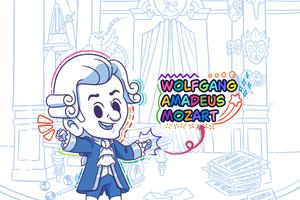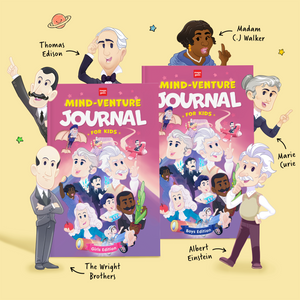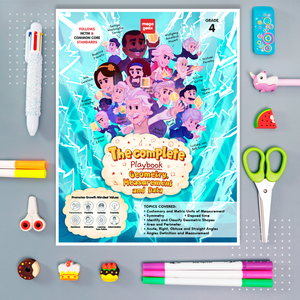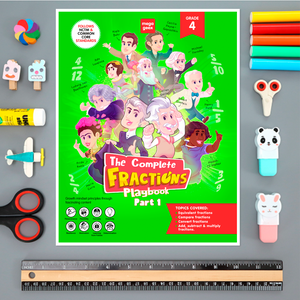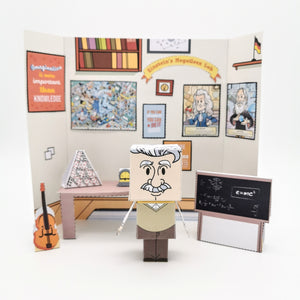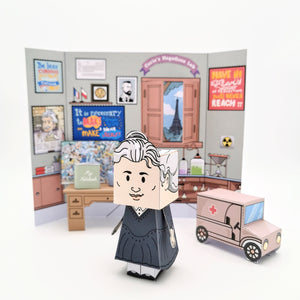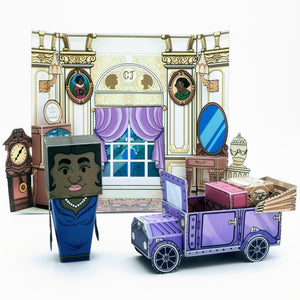Mozart for Kids: The Child Prodigy Who Changed the World of Music
Psst! Have you ever heard of a child prodigy who could play piano like a pro at just three years old? That's right! This amazing kid was none other than Wolfgang Amadeus Mozart, one of the most famous composers in history. He travelled the world with his family, performing for kings and queens, and even composed his very own symphony at the age of eight. So without any further ado let's discover the fascinating tale of Mozart!
- Born: January 27, 1756
- Died: December 5, 1791
- Nationality: Austrian
- Education: Mozart was trained in music by his father from an early age and later studied with prominent composers in Italy and Austria.
- Occupation: Composer, pianist, and violinist
- Best Known for: Extraordinary musical talent and prolific output of works that continue to captivate and inspire audiences worldwide.
A Musical Prodigy is Born: The Early Years
Wolfgang Amadeus Mozart was born on January 27, 1756, in Salzburg, Austria. He was the youngest of seven siblings, but only he and his older sister, Nannerl, survived past infancy. Their father, Leopold Mozart, was a talented composer and musician, and he taught his kids everything he knew about music.
When Wolfgang was just three years old, he showed an incredible talent for playing the piano. By the age of five, he could play the violin too! Mozart's father noticed his son's extraordinary skills and started teaching him how to compose music. Can you imagine creating your own songs at such an early age?
Mozart and his sister, Nannerl, quickly became a sensational duo. They performed together as child prodigies, dazzling audiences with their amazing musical abilities. Their father decided to take them on tour to share their talents with the world. This was the beginning of their exciting journey to becoming famous musicians.
In 1762, when Wolfgang was only six years old, the Mozart family set out on their first tour. They traveled through various European cities, playing music for important people, like kings, queens, and even the Pope! Along the way, Wolfgang learned to play even more instruments, like the harpsichord and the organ.
During these early years, Mozart also began to compose his first pieces of music. At the tender age of eight, he wrote his first symphony, and by the time he was 11, he had already composed his first opera, "Bastien and Bastienne." Mozart's incredible talent continued to grow as he experienced different cultures and musical styles on his family's grand tour of Europe.
In 1764, while visiting London, Mozart met another famous composer, Johann Christian Bach, who was the youngest son of the great Johann Sebastian Bach. Wolfgang was only eight years old, but he was already making a name for himself in the world of music. Johann Christian Bach recognized young Mozart's talent and took him under his wing, helping him develop his skills even further.
Mozart's early years were filled with unforgettable moments and experiences that shaped him into the great composer we know today. As he traveled and played music with his family, he was exposed to different styles and techniques, which he incorporated into his own compositions. This unique blend of influences helped make Mozart's music stand out from the rest.
As a child prodigy, Wolfgang Amadeus Mozart was a true musical genius. His early years laid the foundation for the incredible masterpieces he would create throughout his life. From playing piano and violin at a very early age to composing symphonies and operas as a young boy, Mozart's story is a fascinating and inspiring one that shows us that with talent, hard work, and determination, anything is possible.
So, next time you listen to a beautiful piece of classical music or play an instrument, remember the story of Mozart's early years and how his extraordinary journey began. Who knows? Maybe you'll be inspired to create your own musical masterpieces, just like Wolfgang Amadeus Mozart did when he was a child.
Mozart's Grand Tour of Europe
After their first successful tour, the Mozart family embarked on a series of journeys across Europe to showcase Wolfgang and Nannerl's talents. They visited many different cities, including Paris, Munich, and Vienna, and performed for royal courts and enthusiastic audiences.
During these travels, Wolfgang and his family encountered various styles of music that had a profound influence on his compositions. For example, in France, Mozart was exposed to the elegant and sophisticated music of the French court. In Italy, he became familiar with the passionate and expressive style of Italian opera. All these experiences helped Mozart develop his unique voice as a composer.
One of the highlights of the grand tour was when Mozart met the renowned composer Franz Joseph Haydn in Vienna. Haydn was so impressed by young Wolfgang's skills that he declared, "I tell you before God, as an honest man, your son is the greatest composer known to me by person and repute." This was high praise coming from one of the most famous composers of the time!
In 1770, at the age of 14, Mozart was appointed as an honorary member of the prestigious Accademia Filarmonica in Bologna, Italy. This was an incredible honor for someone so young and demonstrated just how highly regarded Mozart was in the world of music.
Throughout the grand tour, Wolfgang continued to compose music, including symphonies, operas, and chamber music. One of his most famous early operas, "Mitridate, re di Ponto," was composed when he was just 14 years old and had its premiere in Milan.
As Mozart's reputation grew, so did the demand for his music. The experiences and connections he made during the grand tour played a crucial role in shaping his career as a composer. The various styles and techniques he encountered during his travels not only enriched his music but also expanded his understanding of the possibilities within the world of classical music.
Moving to Vienna and Creating Masterpieces
In 1781, Mozart decided to settle in Vienna, a city that was, at the time, the center of musical life in Europe. Vienna was the perfect place for the ambitious and talented composer to further develop his career. It was in Vienna that Mozart wrote some of his most famous and beloved works.
Mozart's time in Vienna was marked by incredible creativity and productivity. He composed numerous operas, including two of his most famous: "Le Nozze di Figaro" (The Marriage of Figaro) in 1786, "Don Giovanni" in 1787 and Die Zauberflöte (The Magic Flute) in 1791. Both of these operas showcased Mozart's ability to create complex and engaging characters while also weaving together beautiful and memorable melodies. Many people believe that in Vienna Mozart wrote his best work!
In addition to his operas, Mozart wrote a series of piano concertos that are still considered some of the greatest works in the genre. He also composed symphonies, like his famous "Jupiter" Symphony, which showcased his skill in writing for a large orchestra. His chamber music, including string quartets and piano sonatas, demonstrated his mastery of smaller, more intimate musical forms.
The Magic of Mozart's Music
Mozart's music is known for its beauty, complexity, and emotional depth. Some of his most famous pieces have interesting stories behind them. For example, "Eine Kleine Nachtmusik" (A Little Night Music) is a lively and playful serenade that Mozart composed for a friend's party. It is now one of his most recognizable works, often played at weddings and other celebrations.
Another fascinating story is the one behind Mozart's final work, the "Requiem Mass." In 1791, Mozart received a mysterious commission from an anonymous patron to compose a requiem, a musical composition for a funeral. As Mozart's health declined, he became obsessed with finishing the piece, even believing that he was writing it for his own funeral. Sadly, Mozart died before completing the requiem, and it was later finished by his student, Franz Xaver Süssmayr.
Mozart's music is unique because it combines technical brilliance with deep emotions, making it both intellectually stimulating and emotionally moving. His compositions have the power to make listeners feel a wide range of emotions, from joy and playfulness to sorrow and introspection.
Tragic End: Mozart's Untimely Death
Sadly, Mozart's incredible life was cut short when he died at the age of 35 on December 5, 1791. His health had been deteriorating for several years, and he struggled with financial difficulties as well. The exact cause of Mozart's death remains a subject of debate among scholars, but it is clear that his loss was a great tragedy for the world of music.
Despite his untimely death, Mozart's legacy as one of the greatest composers in history endures. His music continues to captivate and inspire people all around the world, and his life story serves as a reminder of the power of creativity, dedication, and hard work.
5 Fun Facts about Wolfgang Amadeus Mozart for Kids to Discover!
-
On October 13, 1762, Mozart and his sister Nannerl performed for the Empress Maria Theresa in Vienna. According to reports of the event, after their performance, Mozart ran over to the Empress and asked if he could kiss her hand. The Empress, impressed by his boldness, held out her cheek instead, and Mozart gave her a kiss on the cheek. The Empress was so delighted by the children's performance that she presented them with gifts, including a diamond brooch for Mozart.
-
Mozart had a pet starling bird that he kept as a companion. He even taught it to sing the theme from his Piano Concerto No. 17 in G Major!
-
Mozart's full name was actually Johannes Chrysostomus Wolfgangus Theophilus Mozart. Quite a mouthful!
-
Mozart was an avid billiards player and in 1787, he composed a satirical piece of music inspired by the game called "A Musical Joke" (in German: "Ein musikalischer Spaß"). One section of the piece features a series of abrupt stops and starts, with each instrument playing a different melody, as if they were "out of sync" with each other, mimicking the chaotic nature of a poorly-played game of billiards. The piece is known for poking fun at the conventions of classical music.
-
Mozart was fascinated by the glass harmonica, a musical instrument that produces sound by rubbing wet fingers on the rims of glass bowls. He composed several pieces of music for the instrument, including a concerto.
Mozart for Kids: Frequently Asked Questions (FAQ)
Find answers to your burning questions about Mozart.
What is his most famous piano sonata?
Mozart's most famous piano sonata is likely his Sonata No. 11 in A major, K. 331, which includes the well-known "Rondo Alla Turca" (also known as the Turkish March). The sonata was composed in 1783 and is one of Mozart's most popular and beloved works for solo piano.
What is the composition by Mozart that is most renowned or recognized around the world?
Mozart composed many famous pieces of music, so it's difficult to single out just one as the "most famous." However, some of his most well-known and beloved compositions include:
- Symphony No. 40 in G minor, K. 550
- Piano Concerto No. 21 in C major, K. 467
- The Marriage of Figaro, an opera in four acts, K. 492
- Requiem Mass in D minor, K. 626
- Eine Kleine Nachtmusik, a serenade for strings in G major, K. 525
Each of these works is celebrated for its beauty, originality, and enduring appeal, and they continue to be performed and enjoyed by audiences around the world today.

